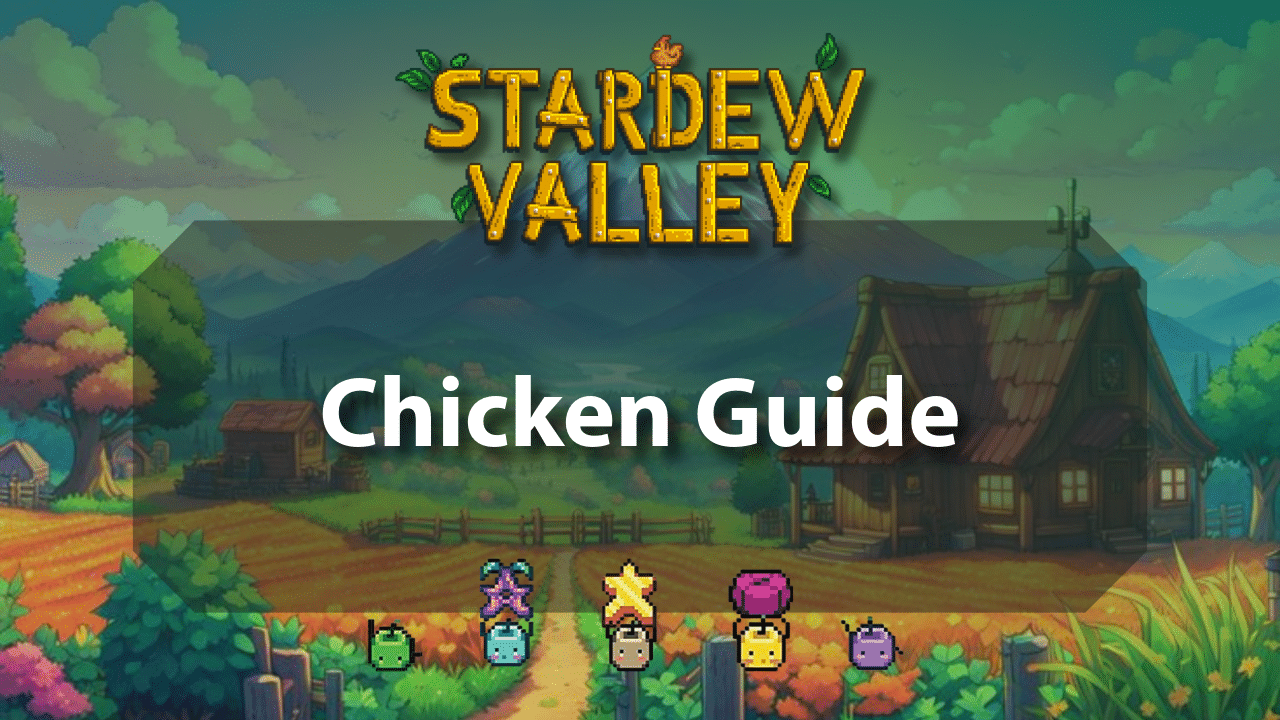
Acquiring Your First Chickens
To begin your poultry farming adventure in Stardew Valley, the first essential step is building a coop. Robin, the carpenter, is the one who can construct it for you, and you’ll need to gather the materials and gold required for the project. A basic coop, which is the most common starting point, requires 300 pieces of wood, 100 pieces of stone, and 4,000 gold. This will allow you to house up to four Stardew Valley chickens, providing a small but efficient start to your poultry operation.
While you’re focused on constructing your coop, it’s important to also think about the needs of your chickens, particularly when it comes to their food. This is where building a silo comes into play. The silo, which stores hay for your chickens during the colder months or on rainy days when they can’t graze, is highly recommended before you build the coop. Constructing a silo costs 100 gold, 100 stone, 10 clay, and 5 copper bars, but it will save you a significant amount of gold in the long run by providing you with the ability to cut grass on your farm and store it for later use.
Once your coop and silo are complete, it’s time to head over to Marnie’s Ranch to purchase your first Stardew Valley Chicken. Chickens can be bought for 800 gold each, and it’s a good idea to buy more than one, as the more chickens you have, the quicker your egg production will be. It also makes it easier to complete certain goals in the game, such as fulfilling the Community Center bundles. Specifically, you’ll need both brown and white eggs, which can only be produced by having different breeds of chickens in your coop. The basic chickens produce either white or brown eggs, and you’ll want a mix of both types to complete your bundle requirements.
Big CoopAs your farm progresses, upgrading your coop becomes a valuable option to expand your poultry farm. The first upgrade, called the “Big Coop,” costs 4,000 gold, 400 wood, and 150 stone, and it allows you to house up to eight chickens. With the bigger coop, you can keep more chickens, which leads to increased egg production, which is a reliable source of income and ingredients for cooking. Further coop upgrades, like the “Deluxe Coop,” increase the number of animals you can house and also unlock new features, such as the ability to house ducks, which lay duck eggs. These upgrades can significantly enhance your farming efficiency, especially if you’re focused on livestock.
Taking care of your chickens is key to ensuring they’re happy and productive. Stardew Valley chickens need to be fed every day, and they’ll produce eggs more regularly when they’re content. You can either give them hay (stored in the silo) or let them roam freely on the grass during the warmer months to feed themselves.
You should also make sure to pet your chickens daily, as this increases their happiness and can result in higher-quality eggs. Happy chickens are more likely to lay large eggs, which can be sold for more gold or used in recipes. Additionally, you may want to ensure your chickens are safe from predators like crows, which can sometimes steal your eggs, by closing the door to the coop each night and protecting them with a fence.
As you expand your poultry farm, you’ll notice that chickens also contribute other resources to your farm, such as feathers, which are used in various crafting recipes. Over time, you can create a thriving poultry business with a variety of chickens, ducks, and even rabbits, all contributing to the success of your farm in different ways.
The Stardew Valley chickens, with their eggs and other resources, play an essential role in helping you achieve your farming goals and add a fun and rewarding aspect to your gameplay. By managing your chickens well, you’ll have a steady stream of eggs and other valuable goods to sell or use in your cooking, giving you the resources to continue expanding your farm and taking on new challenges.
Chicken Varieties
In Stardew Valley, there are several types of chickens that can be acquired, each offering unique characteristics that contribute to the diversity of your farm. The most common chickens are white and brown chickens, which can be purchased from Marnie or hatched from an incubator. These chickens are the bread and butter of poultry farming, with white chickens laying white eggs and brown chickens producing brown eggs. These eggs are essential for cooking recipes and completing certain objectives, such as the Community Center bundles. White and brown chickens are the easiest to acquire and serve as the foundation for your egg production on the farm.
In addition to the standard chickens, there are blue chickens, which are rarer but add an interesting twist to your farm. To unlock blue chickens, you must first reach an 8-heart friendship with Shane and view his associated heart event. Once unlocked, every chicken you buy from Marnie has a 25% chance of being blue.
These blue chickens are visually distinct and can be easier to spot in the grass, thanks to their unique color. While blue chickens lay either white or brown eggs, their main appeal lies in their rarity and how they stand out on your farm. Blue chickens can become an interesting addition to your poultry collection and can help diversify your egg production for recipes or Community Center completion.
Void chickens, on the other hand, are a much more unusual breed and require special conditions to obtain. To acquire a Void Chicken, you must first obtain a Void Egg, which can be bought from Krobus in the Sewers for 5,000 gold or can be obtained randomly through a witch event. Incubating a Void Egg in an incubator results in a Void Chicken, which lays Void Eggs. These eggs are unique in that they can be turned into Void Mayonnaise, a special item that has its own uses and can be sold for a high price. Void chickens add an element of mystery to your farm, with their dark, eerie appearance and special eggs.
The rarest and most prestigious chicken is the Golden Chicken, which is tied to the 100% Perfection achievement in Stardew Valley. Once you reach 100% Perfection, you gain access to the ability to purchase a Golden Egg, either from Marnie for a steep price of 100,000 gold, from Qi’s Walnut Room for 100 Qi Gems, or through a random event involving a golden witch.
After acquiring a Golden Egg, you can hatch a Golden Chicken from an incubator. Golden chickens lay Golden Eggs, which are highly valuable, both as a collectible and as a source of rare income. Golden Eggs can be used in cooking recipes or sold for a significant profit, and they add a touch of exclusivity to your farm, representing the pinnacle of farming achievement.
Each of these chickens brings something different to your Stardew Valley farm, whether it’s the steady egg production of white and brown chickens, the rarity and uniqueness of blue chickens, the mysterious void chickens, or the prestigious Golden Chicken. Managing these chickens and their eggs can be an essential part of growing your farm, helping you achieve milestones, earn valuable resources, and complete key objectives in the game. Whether you focus on the practical or the rare, raising chickens of different types adds depth and variety to your poultry farming experience in Stardew Valley.
Feeding Your Chickens
Keeping your chickens fed is an essential part of maintaining their happiness and ensuring optimal egg production in Stardew Valley. Chickens can be fed either hay or fresh grass, and providing them with the right nourishment is key to keeping them healthy and happy. If you prefer using hay, you can withdraw it from the hay hopper inside your coop and place it on the feeding bench for the chickens to eat.
If you have a silo on your farm, it will automatically store hay for you and send it to the hay hopper, making it much more convenient to feed your chickens. If you run low on hay or don’t have enough stored in your silo, you can always purchase hay from Marnie’s Ranch for 50 gold per piece. Buying hay is a good backup option, especially during the winter when you can’t let your chickens graze outside.
During the non-winter seasons and on days when it isn’t raining, you have the option to let your chickens roam outside and feed on the fresh grass. To do this, simply open the coop door and allow your chickens to wander freely across the grass, which not only provides them with food but also gives them a boost in mood. Grazing on grass helps improve their happiness, which in turn increases the likelihood of them laying more eggs.
However, it’s crucial to ensure that your chickens return to the coop before nightfall. If you leave the coop door open too long and the chickens are still outside when night comes, they may be at risk of being attacked by wild animals, such as foxes or crows, which can harm or steal your eggs. To prevent this, always check the coop door before the evening arrives and make sure all your chickens are safely inside.
By managing their food and safety effectively, you can ensure your chickens stay healthy, happy, and productive. Happy chickens not only lay eggs more frequently but can also lay larger eggs, which can be used for higher-quality products or sold for more profit. Additionally, keeping your chickens fed and safe is crucial for maintaining a thriving poultry farm. Whether you are providing hay during the winter or letting them graze on fresh grass during the warmer months, proper feeding and attention to their needs will help you run a successful poultry operation in Stardew Valley.
Keeping Chickens Happy
Happy chickens are key to producing higher-quality eggs in Stardew Valley, and there are a few important factors to keep them content. To ensure your chickens are as happy as possible, remember the 3 H’s: Hugs, Hay, and Heat. The first and most straightforward way to keep your chickens happy is by petting them daily. Each time you interact with your chickens and give them a little love, their mood improves. This simple action helps them feel cared for, which can lead to increased egg production and even higher-quality eggs. Regular petting is a crucial part of maintaining their happiness and fostering a positive relationship with your animals.
The second essential factor is hay. Chickens need food to stay happy and healthy, and during the winter months, they can’t graze on grass, so you’ll need to ensure there is enough hay in the feeding trough inside the coop. You can store hay in the silo, and the hay will automatically be sent to the hopper. Always make sure there is a sufficient supply, especially during winter or rainy days when you can’t let them out to eat fresh grass. If there isn’t enough hay, your chickens might become grumpy, which can affect their egg-laying frequency and overall mood. Having a steady supply of hay is important not just for their food but also for their well-being.
The third key to keeping chickens happy is heat, especially during the cold winter months. If you don’t use a heater in your coop during the winter, your chickens can become unhappy due to the cold. A heater ensures that your chickens stay warm and comfortable, which prevents them from becoming grumpy. When chickens are cold, they may stop laying eggs, so providing heat is crucial to maintain their productivity and happiness. A heater is a small investment that can go a long way in keeping your chickens comfortable and ensuring they lay eggs consistently.
A grumpy chicken is not just an unhappy animal but also one that may stop laying eggs altogether. There are several reasons why your chickens might become unhappy. If you forget to feed them or don’t provide enough hay in the feeding trough, they may start to feel neglected and stop laying. Similarly, if you fail to pet them regularly or if they’ve been attacked by wild animals like foxes, they may become stressed and refuse to lay eggs. Wild animal attacks can also cause your chickens to lose health or happiness, so it’s important to secure your coop and ensure that no predators can get inside.
By focusing on these three important elements—Hugs, Hay, and Heat—you can create an environment that keeps your chickens happy, healthy, and productive. Pet them every day to boost their mood, ensure they have plenty of hay to eat, and use a heater in the winter to keep them warm. If you maintain these practices, your chickens will be more likely to produce a steady supply of high-quality eggs, which can help you earn more gold, cook valuable recipes, or complete community center bundles. Happy chickens are not only more productive but also contribute to a thriving and successful farm in Stardew Valley.
Egg Production and Profit
Mature and well-fed chickens in Stardew Valley are reliable producers of eggs, offering one egg each day as long as they are healthy and cared for. To ensure a consistent supply of eggs, it’s essential to keep your chickens happy by feeding them daily with hay or allowing them to graze on grass during the warmer seasons. A well-maintained chicken coop and regular attention to your chickens’ needs will help them stay productive.
As your friendship with your chickens grows, they become more likely to produce large eggs, which are worth more than regular eggs. This friendship is built through daily interactions such as petting them and ensuring their needs are met, increasing their mood and enhancing their egg production.
Large eggs, which have a higher market value, can be a great source of income, especially when sold directly. However, a more profitable option is to process these eggs into mayonnaise using a Mayonnaise Machine. Mayonnaise sells for a significantly higher price than a regular egg, and this method is highly profitable if you have a steady supply of eggs. Additionally, mayonnaise is a valuable cooking ingredient for various recipes, making it even more useful for both financial gain and advancing in the game’s cooking objectives. By managing your chickens’ happiness, increasing your friendship with them, and utilizing eggs in a Mayonnaise Machine, you can maximize your farm’s productivity and profitability.
Beyond simple egg production, nurturing your chickens and expanding your chicken farming operation allows you to take full advantage of the potential income and resources provided by eggs and mayonnaise. Whether selling them directly or processing them for a higher profit, maintaining a happy and healthy flock of chickens plays a key role in your Stardew Valley farming success.
Egg TypeBase Price Regular Egg50g Large Egg95g Void Egg65g Golden Egg500gMayonnaise made from eggs in Stardew Valley varies in price depending on the type of egg used. Regular Mayonnaise sells for 190 gold, which is a good profit when made in bulk. Void Mayonnaise, made from Void Eggs laid by Void Chickens, is worth more, selling for 275 gold per jar. The most valuable of all, however, is Golden Mayonnaise.
When you make mayonnaise from a Golden Egg, you receive three jars of Golden Mayonnaise, each one worth significantly more than regular or Void Mayonnaise. This makes Golden Mayonnaise a highly profitable item, especially for those who have reached 100% Perfection and are able to access Golden Eggs. By utilizing different types of eggs and the Mayonnaise Machine, you can maximize the value of your egg production and increase your farm’s income in Stardew Valley.
Additional Tips
Building a silo before getting chickens is an essential step in managing your poultry farm efficiently. The silo allows you to store hay, which can be used to feed your chickens during the winter or on rainy days when they can’t graze outside. Letting your chickens roam outside to eat grass is a great way to improve their mood and save on hay, as they will naturally feed themselves from the grass. However, always remember to close the coop door at night to protect your chickens from wild animal attacks, which could harm them or steal their eggs.
Petting your chickens daily is another key to keeping them happy and increasing their friendship. A higher level of friendship with your chickens can result in larger eggs and better egg production. Upgrading to a Deluxe Coop is highly recommended as it provides an auto-feeder, making it easier to feed your chickens without needing to manually place hay in the feeding trough every day. If you want to ensure you have enough hay for the winter, consider building multiple silos to store large quantities, as hay is essential when the grass is not available to feed your chickens.
It’s also important to be aware of Marnie’s shop schedule, as her shop is closed on Mondays and Tuesdays. Plan your purchases of hay, chickens, or other supplies accordingly, so you don’t miss out when you need them most. By following these steps, you can keep your chickens happy, healthy, and productive year-round.













